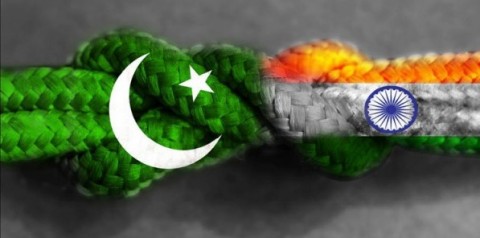India Pakistan Remain Tense over Ceasefire Violations
India Pakistan hostilities continue

NEW DELHI: India has responded sharply to a fresh ceasefire violation where Pakistani rangers targeted 13 border outposts in Samba sector on Thursday. A day earlier, on New Year’s Eve, an Indian jawan and four Pakistani soldiers were killed in an exchange of fire between the two sides.
Thursday’s breach constitutes the third ceasefire violation by Pakistan in the past three days and the seventh in the past eight days. “They (Pakistan) have violated the norms on International Border. We are going to lodge strong protest to them (over ceasefire violation),” Inspector-General of Border Security Force Rakesh Sharma told reporters in Jammu (as quoted in The Hindu).
Indian Home Minister Rajnath Singh cautioned Pakistan, saying, ““Pakistan should not do this. Diplomats of both the countries remain in constant touch,” Mr. Singh said, adding normalcy will return soon.”
Pakistan in turn blamed India for violating the ceasefire. A report in Pakistani newspaper Dawn states, “What is alarming about the latest, however, is that the Pakistani version suggests that two Rangers were lured into a flag meeting with their Indian counterparts and then killed in a hail of gunfire… If true, it would be an astonishing breach of the rules of engagement and would surely make managing the peace in an already fraught environment infinitely more difficult.”
Tensions between the two countries have been on the rise with increasing ceasefire violations through 2014. In October, over 20 civilians were killed and dozen others injured in the worst violation to date of a 2003 ceasefire.
The firing led to a dip in relations between the two countries, with Pakistan penning a letter to UN Secretary General Ban Ki Moon that invoked the UN to implement resolutions for a plebiscite in Kashmir.
The letter marked a major reversal of Pakistan’s position for over a decade, sending bilateral relations between the two countries plummeting. India reacted to the letter on Tuesday, with Foreign Ministry spokesperson Syed Akbaruddin dismissing the role of a third party. “The road to a peaceful and co-operative relationship between India and Pakistan runs from Islamabad via Lahore to New Delhi. If you divert that road to New York or elsewhere, it will not serve any purpose, because there is no place for third party in India-Pakistan relations.”
The letter was a clear move to internationalise the Kashmir issue. Penned by Pakistan’s National Security Advisor Sartaj, it stated, “As you are aware, the Jammu and Kashmir dispute is one of the long outstanding issues on the agenda of the United Nations Security Council, whose resolutions promising the holding of a plebiscite, under the auspices of the United Nations, for self-determination of the people of Jammu and Kashmir, remain valid though unimplemented to date. For decades, Pakistan has been reminding the United Nations and the international community to fulfill that promise, in the interest of durable peace and security in the region.”
The ceasefire, signed in 2013, was also breached in August this year, with the round of firing in October following a calm September. The hostilities came on the heels of the cancellation of secretary-level talks over Pakistan’s decision to meet Kashmiri separatist leaders in August. The talks had signalled the prospect of renewed ties between the two countries, after Indian Prime Minister Narendra Modi invited Pakistani counterpart Nawaz Sharif to attend his swearing-in ceremony, with the two leaders meeting in New Delhi on the same occasion.
Speaking at the United Nations in September, Sharif said that India’s decision to cancel the talks had resulted in a “missed opportunity.” Modi, speaking at the UN the next day, responded saying that India was not opposed to talks, but would not participate “in the shadow of terror” and that it was upto Pakistan to “create a conducive atmosphere for talks.”
With the continuing hostilities, that “conducive atmosphere” seems nowhere in sight.



